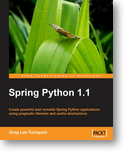3.2.3.3. PythonConfig and @Object - decorator-driven configuration¶
By defining a class that extends PythonConfig and using the @Object decorator, you can wire your application using pure Python code.:
from springpython.config import PythonConfig
from springpython.config import Object
from springpython.context import scope
class MovieBasedApplicationContext(PythonConfig):
def __init__(self):
super(MovieBasedApplicationContext, self).__init__()
@Object(scope.PROTOTYPE)
def MovieLister(self):
lister = MovieLister()
lister.finder = self.MovieFinder()
lister.description = self.SingletonString()
self.logger.debug("Description = %s" % lister.description)
return lister
@Object(scope.SINGLETON)
def MovieFinder(self):
return ColonMovieFinder(filename="support/movies1.txt")
@Object(lazy_init=True) # scope.SINGLETON is the default
def SingletonString(self):
return StringHolder("There should only be one copy of this string")
def NotExposed(self):
pass
As part of this example, the method NotExposed is also shown. This indicates that using get_object won’t fetch that method, since it isn’t considered an object.
By using pure Python, you don’t have to deal with any XML. If you look closely, you will notice that the container code below is only different in the line actually creating the container. Everything else is the same as was in the XMLConfig & YamlConfig examples.:
from springpython.context import ApplicationContext
container = ApplicationContext(MovieBasedApplicationContext())
service = container.get_object("MovieLister")
3.2.3.3.1. Object definition inheritance¶
PythonConfig’s support for abstract objects is different to that of XMLConfig or YamlConfig. With PythonConfig, the children object do not automatically inherit nor override the parents’ properties, they in fact receive the values returned by their parents and it’s up to them to decide, using Python code, whether to use or to discard the values received.
A child object must have as many optional arguments as there are expected to be returned by its parent.
Observe that in the following example the child definitions must define an optional ‘req’ argument; in runtime they will be passed its value basing on what their parent object will return. Note also that request is of PROTOTYPE scope, if it were a SINGLETON then both get_customer_id_request and get_customer_profile_request would receive the very same Request instance which, in other circumstances, could be a desirable effect but not in the example.:
# stdlib
import uuid4
# .. skip Spring Python imports
class Request(object):
def __init__(self, nonce=None, user=None, password=None):
self.nonce = nonce
self.user = user
self.password = password
def __str__(self):
return "<id=%s %s %s %s>" % (hex(id(self)), self.nonce, self.user, self.password)
class TestAbstractContext(PythonConfig):
@Object(scope.PROTOTYPE, abstract=True)
def request(self):
return Request()
@Object(parent="request")
def request_dev(self, req=None):
req.user = "dev-user"
req.password = "dev-password"
return req
@Object(parent="request")
def request_test(self, req=None):
req.user = "test-user"
req.password = "test-password"
return req
@Object(parent="request_dev")
def get_customer_id_request(self, req=None):
req.nonce = uuid4().hex
return req
@Object(parent="request_test")
def get_customer_profile_request(self, req=None):
req.nonce = uuid4().hex
return req
Same as with the other configuration modes, if you need to get an abstract object from a container, use the .get_object’s ignore_abstract parameter, otherwise springpython.container.AbstractObjectException will be raised:
# .. skip creating the context
# No exception will be raised, even though 'request' is an abstract object
request = ctx.get_object("request", ignore_abstract=True)
# Will show the object
print request
# Will raise AbstractObjectException
request = ctx.get_object("request")
